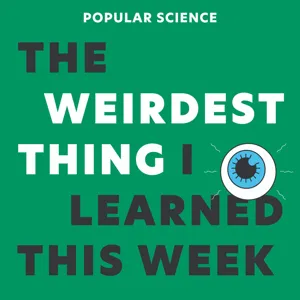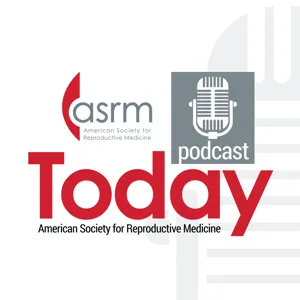Podcast Summary
Simplifying Home Project Hiring with Angie: Angie streamlines home project hiring with upfront prices, instant booking, and comprehensive solutions, while debunking misconceptions about vaginal health on a podcast.
Angie simplifies the process of finding and hiring skilled professionals for home projects. Whether it's a small repair or a large-scale project, Angie makes it easier for homeowners to connect with local pros and get the job done. Angie's platform offers upfront prices, instant booking, and even handles projects from start to finish. Additionally, the name change from Angie's List to just Angie reflects the company's evolution from a list of service providers to a comprehensive solution for home projects. Meanwhile, in a lighter vein, during a discussion on the podcast "Weirdest Thing I Learned This Week," the hosts shared interesting facts about vaginal health. Jen Gunter, a renowned OB-GYN, shared that the hymen isn't about the penis, challenging common assumptions about its function. These intriguing tidbits offer a glimpse into the wealth of knowledge that exists beyond the surface level.
The hymen may have evolved as a protective mechanism for women's vaginas, not a virginity indicator: The hymen's association with virginity and pain during first sex might not be accurate, as it may have originally served as a protective barrier for women in our evolutionary past.
The hymen and its association with virginity and pain during first sexual experience may not have evolved for those purposes. Instead, it may have been a protective mechanism for women in our evolutionary past, when they were exposed to dirt and debris, by providing a stronger barrier for the vagina. This theory explains the wide range of hymenal variants and its unreliability as a virginity indicator. Additionally, the presence of the clitoris, which can bring great sexual pleasure, contradicts the theories suggesting that first sex should be painful or disappointing to keep women from seeking other sexual partners. Overall, these theories and assumptions about the hymen and sexual experiences have been around for a long time, but they may not hold up to scientific scrutiny.
Myth of painful first sex as virginity indicator: Most women don't experience significant pain during their first sexual encounter and it's not necessary for bonding. Seek accurate information and professional help for sexual health concerns.
The idea of a painful first sexual experience acting as a virginity indicator and creating a strong bond between partners is a myth that has persisted for a long time, despite evidence suggesting otherwise. Biologically, humans are different from animals in many ways, including our reproductive systems and methods of infant care. The belief that a painful first sexual experience is necessary for bonding is not supported by the facts, as most women do not experience significant pain during their first time, and only a small percentage of those who do report severe pain. Additionally, there are other reasons, such as sexual inexperience or past trauma, that can contribute to painful sex. It's important to approach sexual health and well-being with accurate information and to seek professional help if necessary, rather than relying on outdated myths. The speaker also highlighted the prevalence of dogma and misinformation in medicine and history, and encouraged critical thinking and questioning of accepted wisdom.
Historical representation of women's bodies in art and medicine overlooked: Throughout history, women's bodies in art and medicine were often overlooked or oversimplified, while men's bodies received more attention and detail. This trend continued in the development of birth control, where women's reproductive rights were advocated for but effective methods took decades to be developed due to patriarchal influences.
Throughout history, the representation of women's bodies in art and medicine has often been oversimplified or absent, while men's bodies were given more attention and detail. This trend can be seen in ancient Greek statues, where male genitalia were depicted realistically while female genitals were not. This pattern continued in the development of birth control, where a woman named Margaret Sanger advocated for a more effective method of birth control in the early 1900s, but it wasn't until the 1950s that a daily pill was developed, thanks to the collaboration between Sanger, researcher Gregory Pincus, and gynecologist John Rock. Despite Rock's strong Catholic beliefs, he was a champion for women's reproductive rights and played a crucial role in bringing the birth control pill to market. This history highlights the patriarchal influences on the way women's bodies have been viewed and treated throughout history, and the importance of questioning these biases before accepting medical knowledge.
Marketing the Birth Control Pill as an Enhanced Version of the Rhythm Method: Gregory Pincus and John Rock marketed the first birth control pill as an improved rhythm method to gain acceptance from the Church and public, but it was actually designed to mimic a withdrawal bleed, not a true menstrual period.
Gregory Pincus and John Rock aimed to create the first birth control pill as a more effective and reliable alternative to the Catholic Church's accepted method of birth control, the rhythm method. However, they marketed the pill as an enhanced version of the rhythm method to gain acceptance from the Church and the public. The pill, which was initially marketed as having monthly long cycles with a weekly sugar pill break, was actually designed to mimic a withdrawal bleed, not a true menstrual period. Despite their efforts, the Church did not officially accept the pill as a form of birth control.
Historical reasons for weekly sugar pills in birth control: Despite no longer being necessary, the idea of weekly sugar pills in birth control persists due to historical reasons, including reassurance and societal norms.
The use of weekly sugar pills in birth control pills has persisted due to historical reasons, including the need for reassurance before reliable pregnancy tests were available and the belief that women were not intelligent enough to manage the medication without a specific start date. Despite the fact that many women and doctors now understand that these pills are not necessary, the idea of starting on a Sunday and taking a break for a week every month continues to be perpetuated. This discussion sheds light on the complex history of birth control and the role of societal norms and beliefs in shaping women's healthcare.
Historical beliefs and patriarchal thinking have perpetuated misconceptions about women's menstrual cycles: Education and advancements in reproductive health enable women to make informed choices about their bodies and challenge outdated beliefs.
Misconceptions and taboos surrounding women's menstrual cycles and the need for periods run deep, but education and advancements in reproductive health provide women with more choices and control over their bodies. The idea of menstruation as a necessary cleansing process is rooted in historical beliefs and patriarchal thinking. With the use of birth control, such as the pill, women can avoid having periods, and the absence of menstruation does not necessarily indicate ill health. As society advances, it's crucial to challenge these outdated beliefs and provide accurate information to empower individuals to make informed decisions about their bodies and their health. Additionally, recent research from the Australian Facility for Taphonomic Experimental Research (AFTER) sheds light on an intriguing fact: bodies continue to move and decompose after death, challenging our perceptions of the human body and the natural processes of life and death.
Insights from Body Farms: Understanding Post-Mortem Decomposition: Body farms provide crucial information on post-mortem decomposition through observation and research. Mummification occurs year-round in dry climates, and midday is the best time for observations. Unexpected corpse movement was discovered during a 17-month study.
Body farms, or facilities where bodies decompose naturally to help inform pathology and forensic science, provide valuable insights into what happens to a body after death. These facilities exist in various parts of the world to study different environmental scenarios. For instance, a body farm in Australia discovered that mummification occurs all year round due to the dry climate. There are fewer than a dozen body farms globally, including a few in the US. Researchers study decomposition through time-lapse cameras and have found that taking pictures every 30 minutes during daylight hours does not yield more accurate post-mortem interval estimation markers than traditional once-a-day checks. However, they did find that the best time of day for observations is midday. An intriguing unpublished finding from a study on a normal male corpse is that it moved more than expected during the 17-month observation period. The arms moved from beside the body to the side, and researchers believe this is the first time someone has documented such extensive corpse movement.
Changes in body position during decomposition: Decomposition processes can cause significant changes in body position, challenging the reliability of this evidence in crime scene investigations
The position of a deceased body may provide less information than previously assumed in crime scene investigations. This is due to the various processes of decomposition, including rigor mortis, putrefaction, and gas buildup, which can cause significant changes in body position. These changes can be caused by a variety of factors, including insect activity and the weakening of tissues. Even the phenomenon of coffin births, where gas buildup in a deceased pregnant woman can result in the expulsion of the fetus, demonstrates the potential for significant movement during decomposition. As a result, investigators may need to consider the role of decomposition in interpreting the evidence at a crime scene and be aware that the position of a body may not be as reliable an indicator as previously thought.
Exploring the complexities of estimating time of death and the importance of body farms: Body farms aid in researching decomposition processes, improving time of death estimation methods, and Angie's new platform simplifies home projects with upfront prices, instant booking, and project handling.
Estimating the time of death is a complex process with many variables, and our current methods have limitations. Some factors, like body fat saponification and maceration, are not well understood or common in all corpses. Body farms are essential for researching decomposition processes and improving our methods. The origin of the hymen and its connection to the Catholic Church was another fascinating topic discussed. Overall, the podcast explored various intriguing and lesser-known facts about the human body and history. Additionally, Angie's new platform simplifies the process of finding skilled professionals for home projects, making it easier to maintain and improve homes. Angie's rebranding as a single word is to make the service more accessible and convenient, with features like upfront prices, instant booking, and project handling from start to finish.




